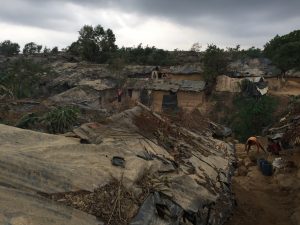“India is not a dharamshala [public shelter] where anybody can stay where they like,” Anil Vij, home minister of the Indian state of Haryana, was quoted as saying by news agency ANI. His comments were directed at reports claiming that some Rohingya refugees had gathered in Haryana’s Mewat district.
Indian leaders of yore, from Jawaharlal Nehru to Atal Bihari Vajpayee, have evoked the Sanskrit phrase vasudeva kutumbakam (“the world is one family”). For most of its history, India has stuck to this principle, helping refugees from the subcontinent fleeing persecution — be it Tibetans, Sri Lankan Tamils, Chakmas, or Afghans. It has pursued the international legal principle of non-refoulement in spirit if not coding it into law, not returning refugees back to a place where they may face persecution based on “race, religion, nationality, membership of a particular social group or political opinion.”
This use of “strategic ambiguity” has not been a perfect refugee policy, but India has never outrightly veered off its historic path of non-refoulement as it has with the Rohingyas under Prime Minister Narendra Modi.
Earlier this week, the Indian government detained 150-170 Rohingya refugees and plans to deport them to Myanmar, despite several protests by human rights groups. Tens of thousands of Rohingyas fled from Myanmar in 2017 after a brutal campaign of killing, rape, and beatings by the country’s military. The United Nations described the Tatmadaw’s actions as a “textbook example of ethnic cleansing.”
With the military coup on February 1, following a general election which Aung San Suu Kyi’s National League for Democracy won by a landslide, activists fear that things may get worse for the country’s minorities. Based on a tally by the Assistance Association for Political Prisoners activist group, nearly 250 people have died already for protesting against the military rule.
After the 2017 exodus, a majority of the refugees ended up in Bangladesh, which now hosts nearly a million Rohingya refugees. Approximately 40,000 are in India. The refugees represent 90 percent of Myanmar’s Muslim population, which has now been displaced.
“Myanmar’s long-abusive military is even more lawless now that it is back in power. The Indian government should uphold its international law obligations and protect those in need of refuge within its borders,” said Meenakshi Ganguly, South Asia director of Human Rights Watch.
“The increasingly brutal repression by Myanmar military, following the coup, puts any Rohingya returnees at serious risk of abuse.”
NewsClick reports that schools for young displaced children in India’s refugee camps have started closing down with the current wave of detentions and “students seem to have lost all hope.” Many have started fleeing the camps.
Rohingyas have been detained in Jammu for not holding valid passports required as per the Passports Act, according to an official as reported by The Print. Refugees who fled violence – which the U.N. has time and again likened to “genocide”– in Myanmar may have difficulty providing documents given their diminished legal rights and statelessness in Myanmar. Indian lawyer Prashant Bhushan has requested an urgent hearing from the Indian Supreme Court of a plea to release and protect the refugees. The apex court has agreed to hear his plea on March 25, 2021.
Despite multiple attempts by Bangladesh, the U.N.-backed repatriation process has failed to take off. In 2018, Myanmar and Bangladesh had reached an agreement to repatriate the refugees in a “voluntary, safe, dignified, and sustainable” manner. However, some have questioned Myanmar’s seriousness to let the refugees return as it continues to expel refugees all the while negotiating to take them back.
Myanmar does not recognize Rohingyas as an ethnic group and insists that they are “Bengali” migrants living illegally in the country. They have long been denied citizenship under Myanmar’s Nationality Law and are often restricted from freedom of movement and access to state education and civil service jobs. In other words, they have essentially been “stateless” since 1982.
Last month, India’s Permanent Representative to the U.N. Ambassador T. S. Tirumurti spoke at the informal U.N. General Assembly meeting on the situation in Myanmar after the military coup. He stated that India has the highest stake in resolving the issue since it is the only country that shares a long border with both Bangladesh and Myanmar. Tirumurti emphasized the need for an early repatriation of Rohingyas to Myanmar.
Recent reports have highlighted the degradation of India’s democracy under Modi. As it moves from a “Free” to a “Partly Free” nation as noted by Freedom House and an “Electoral Democracy” to an “Electoral Autocracy” as reported by the Varieties of Democracy Institute, the world’s largest democracy is also shedding its humanitarian concerns for one of the most vulnerable refugee populations around the world.

































